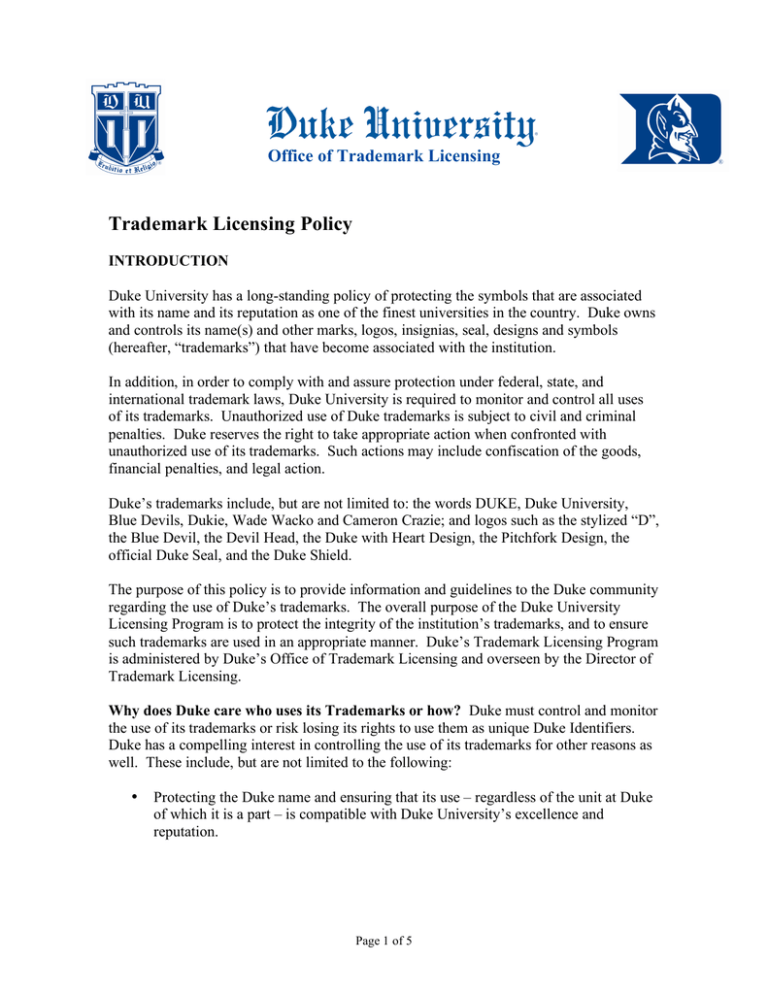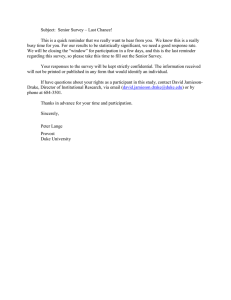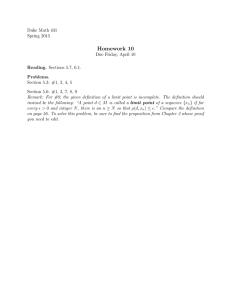
Office of Trademark Licensing
Trademark Licensing Policy
INTRODUCTION
Duke University has a long-standing policy of protecting the symbols that are associated
with its name and its reputation as one of the finest universities in the country. Duke owns
and controls its name(s) and other marks, logos, insignias, seal, designs and symbols
(hereafter, “trademarks”) that have become associated with the institution.
In addition, in order to comply with and assure protection under federal, state, and
international trademark laws, Duke University is required to monitor and control all uses
of its trademarks. Unauthorized use of Duke trademarks is subject to civil and criminal
penalties. Duke reserves the right to take appropriate action when confronted with
unauthorized use of its trademarks. Such actions may include confiscation of the goods,
financial penalties, and legal action.
Duke’s trademarks include, but are not limited to: the words DUKE, Duke University,
Blue Devils, Dukie, Wade Wacko and Cameron Crazie; and logos such as the stylized “D”,
the Blue Devil, the Devil Head, the Duke with Heart Design, the Pitchfork Design, the
official Duke Seal, and the Duke Shield.
The purpose of this policy is to provide information and guidelines to the Duke community
regarding the use of Duke’s trademarks. The overall purpose of the Duke University
Licensing Program is to protect the integrity of the institution’s trademarks, and to ensure
such trademarks are used in an appropriate manner. Duke’s Trademark Licensing Program
is administered by Duke’s Office of Trademark Licensing and overseen by the Director of
Trademark Licensing.
Why does Duke care who uses its Trademarks or how? Duke must control and monitor
the use of its trademarks or risk losing its rights to use them as unique Duke Identifiers.
Duke has a compelling interest in controlling the use of its trademarks for other reasons as
well. These include, but are not limited to the following:
•
Protecting the Duke name and ensuring that its use – regardless of the unit at Duke
of which it is a part – is compatible with Duke University’s excellence and
reputation.
Page 1 of 5
•
Ensuring that any products or services that bear Duke trademarks are of high
quality and are used only in connection with products and services with which the
institution has chosen to be identified and which, as a result, it has assumed some
level of responsibility;
•
Preventing misleading or inaccurate portrayals of Duke’s relationship to others or
to activities, and preventing others from taking advantage of the goodwill the
institution has developed and which is symbolized by its trademarks; and
•
Ensuring that products and services bearing Duke’s trademarks protect the integrity
and reputation of the institution, maintain and build upon the goodwill of the
institution, and promote support for and increase awareness of the institution, its
mission and goals.
POLICY FOR INTERNAL USE OF DUKE TRADEMARKS BY DUKE
DEPARTMENTS, GROUPS AND STUDENT ORGANIZATIONS
Trademark Uses That May Not Require Approval: Some uses of Duke trademarks by
Duke
departments, groups and registered student organizations may not require prior approval
from Duke’s Office of Trademark Licensing, including:
•
The use of Duke trademarks by Duke departments, groups, and registered student
organizations in the ordinary course of conducting Duke business provided they
make no changes to the design or approved colors of Duke trademarks, and adhere
to the Guidelines contained in this policy. Examples include the use of unmodified
Duke trademarks on stationery, business cards, reports, official Duke catalogs,
publications, reports and similar materials, and materials used in academic courses.
•
Use of the Duke name or other of its trademarks in connection with news reporting
and other fair uses that do not undermine Duke’s rights to its trademarks.
Trademark Uses That Require Approval: All uses of Duke trademarks on products
require prior approval from the Office of Trademark Licensing, even if the proposed uses
do not involve the sale of a product; e.g., promotional items for conferences or meetings,
items for fundraisers, items for giveaways, gifts, etc.
All other uses, except those listed above in the section “Trademark Uses That May Not
Require Approval.”
Duke departments, groups, and registered student organizations may not assign rights to or
otherwise grant permission to any other entity for use of Duke trademarks for any purpose
without prior review and approval by Duke’s Office of Trademark Licensing.
Page 2 of 5
Products must be Purchased from Licensed Manufacturers Only (Duke Licensees):
All products bearing Duke’s trademarks must be purchased only from Duke licensees. To
ensure consistency in the use of Duke’s trademarks, and to ensure compliance with a wide
range of requirements associated with the manufacture and use of Duke’s trademarks,
products bearing Duke’s trademarks may be purchased only from companies that are
officially licensed by Duke to manufacture or distribute products bearing its trademarks.
There are some 400 companies officially licensed by Duke to manufacture products which
bear Duke’s trademarks.
Sweatshop Issues: Duke is committed to conducting its business affairs in a socially
responsible and ethical manner. Duke has taken a leadership role in efforts to ensure
decent and humane working conditions in factories. Duke requires that all manufacturers
of products bearing Duke’s trademarks strictly adhere to a Code of Conduct in the
manufacture of those products. Duke prohibits products bearing its trademarks from being
manufactured in abusive and unfair labor conditions. Issues addressed in the Code of
Conduct include, but are not limited to: wages & benefits, working hours, overtime
compensation, child labor, forced labor, health and safety, non-discrimination, and
harassment or abuse. In addition, Duke requires all of its licensees to publicly disclose the
names and locations of all of their factories which manufacture products that bear Duke’s
trademarks. Duke Licensees are required to subject those factories to independent
monitoring of factory labor conditions through two organizations with which Duke is
affiliated, the Worker Rights Consortium and the Fair Labor Association.
Guidelines for Use of Trademarks:
Duke trademarks may not be altered in any way.
Duke trademarks may not be used in conjunction with the name or trademark(s) of any
other entity without the prior written permission of that entity. If permission is granted by
the Office of Trademark Licensing to use both the Duke trademark and another party’s
trademark in a design, the trademarks must be distinct and separate from each other, and
Duke’s trademarks must not be overshadowed or diminished in any way in comparison to
the other entity’s trademark. Approval of any such dual use of Duke trademarks will be
limited to instances where there is a compelling institutional priority in allowing such a
use.
Duke trademarks may not be used in any manner that suggests or implies Duke’s
endorsement of other organizations, companies, products, services, political parties or
views, or religious organizations or beliefs.
Duke’s trademarks may not be used in any way that discriminates or implies
discrimination against any persons or groups based on age, ancestry, belief, color, creed,
disability, national origin, race, religion, sex, sexual orientation or veteran status, or in any
other way that would be a violation of Duke’s anti-discrimination policies or practices.
Page 3 of 5
No one other than Duke may claim copyright or trademark rights in or seek to register any
design that uses Duke trademarks.
Images of the Duke Chapel may not be used on apparel, or other products unless such
products are to be used specifically for Duke Chapel functions, or by Duke Chapel staff.
All uses of Duke trademarks on products will incorporate the appropriate trademark
designation symbols, i.e., all designs using Duke trademarks will include ®, with the
exception of the word DUKE, which will use TM.
Duke will not approve the use of Duke trademarks in connection with certain types of
products. These include, but are not limited to the following:
•
•
•
•
•
•
•
•
•
Products that could be used to injure or kill;
Alcohol-related products;
Tobacco-related products;
Illegal drug-related products;
Sexually suggestive products or language;
Gambling-related products;
Food and beverage products and accompanying packaging (other than for limited
internal consumption in connection with official Duke events, and approved in
advance by Duke’s Office of Trademark Licensing);
Products that present an unacceptable risk of liability;
Products that are harmful to the mission or image of the institution.
Certain artwork or designs will not be approved for use in conjunction with Duke’s
trademarks. These include, but are not limited to the following:
•
•
Art depicting or implying the use or endorsement of
o alcohol;
o illegal drugs;
o tobacco products;
o firearms or other weapons;
o racist, sexist, hateful, demeaning or degrading language or statements;
o profanity;
o sexual acts;
o statements impugning other universities;
Art or a design incorporating trademarks or copyrights not owned by Duke, unless
written permission for such use satisfactory in form and substance to Duke is
obtained from the trademark holder or copyright owner, and approved in advance
by the Office of Trademark Licensing.
Approval to use a Duke trademark for a one-time application only (for example, a t-shirt)
does not constitute approval to use the trademark again, or in connection with any other
item, or to change the design in any way, without seeking additional approval.
Page 4 of 5
Student Athletes: Any and all uses of the names, numbers, and/or images of Duke
student athletes must comply with Duke policies and NCAA regulations. Questions should
be directed to the Director of Trademark Licensing, who will consult as appropriate with
Duke University Athletics.
Approval Process: Send an e-mail to the Director of Trademark Licensing, Jim
Wilkerson at jim.wilkerson@duke.edu. Include the following information: your
department/organization, requestor’s name, e-mail address and telephone number,
description of product(s) to be ordered, quantity desired, the date the product is needed,
and artwork including all names/logos to appear on product. Please describe the
purpose/event the product is being ordered for; the start and end date of the event; whether
the product is being sold or given away; and if the product is being sold, where the
proceeds from the sales will be directed. The review and approval process can take up to
two weeks.
Appropriate Use of Trademarks: In instances where there is uncertainty regarding the
appropriate use of any Duke trademarks, the Director of Trademark Licensing will consult
with Duke’s Executive Vice President, the Senior Vice President of Public Affairs and
Government Relations, and/or Duke’s Office of Legal Counsel. Duke reserves the right to
disapprove any use of its trademarks, even if such use is not explicitly prohibited by this
policy or these guidelines.
Contact: For further information or assistance, contact Duke’s Office of Trademark
Licensing at 919-684-2065.
Page 5 of 5




